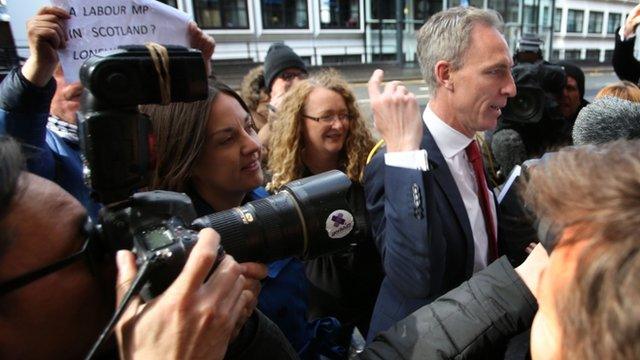What now for Scottish Labour?
- Published

Kezia Dugdale and Jim Murphy arrived at a meeting of Scottish Labour's ruling body
Over the weekend, it was possible to discern two competing views about Jim Murphy's resignation as leader of the Scottish Labour Party. Only two? OK, two broad groupings then.
Group A reckon that the manner of Mr Murphy's going did him credit. That, instead of flouncing from the political stage, he intends to craft sage advice for his successor in the shape of reforms which might be implemented to begin the process of renewal.
Group B reckon that Mr Murphy has failed to acknowledge his own contribution to the scale of the defeat - and that his suggestion of an immediate move to one member one vote (OMOV) for electing his successor is presumptuous.
Life in the People's Party is thus somewhat troubled, especially as the People in question are rather fewer in number than previously.
To add to the noxious mix, there is a dispute over the nature of the links between Labour and the wider union movement.
Mr Murphy said that Len McCluskey, the leader of Unite, had demonstrated "destructive behaviour" towards him and the party.
Stressing his support for OMOV, Mr Murphy added: "The leader of the Scottish Labour Party doesn't serve at the grace of Len McCluskey and the next leader of the UK Labour Party should not be picked by Len McCluskey."
Mr McCluskey responded by declining to play his seemingly allotted role as bogeyman. He was, he said, not responsible for losing Scotland to the SNP.
It has been suggested - and rebutted - that Unite might consider disaffiliating from Labour and even shifting to the SNP. A couple of small points might be made with regard to that.

Len McCluskey is the leader of union Unite
Firstly, the SNP does not operate by block affiliation. Members of Unite would be individually welcome within the SNP. Indeed, many will already be there, given the size of the SNP Trades Union Group. (It has 15,000 members.)
I suggested wickedly to one party insider that the SNP might take the members - but leave Len McCluskey to Labour. I received a slightly mischievous chuckle in response.
Secondly, I think it unlikely that such a wholesale transfer would be contemplated, were it feasible. It seems more likely that the rumblings of discontent from union leaderships about Labour are among the noises caused when a party is disturbed and resettling.
Union and non-union
Bear in mind always that the position of union leaders will not be the unanimous position of the leadership. OMOV may not yet be entirely entrenched within Scottish Labour - but the days of the overwhelming union block vote have largely gone.
By definition, given the outcome of the recent election, many, many union members voted SNP, regardless of their union's chosen affiliation. Longer term, that is where the real contest lies. With the people, whether union members or not.
So what next for Scottish Labour? The prospect of the Holyrood elections next year may concentrate minds somewhat - although not yet, it would appear. Leaderless across the UK and soon to be leaderless in Scotland (Mr Murphy steps down formally next month), there is more internal discussion and dispute still to come.
Labour's troubles in Scotland are many and deep. I listed them in a previous blog, but they include...
a decline in tribal loyalty
the loss of community links
uncertainty of message
and imprecision on standing for Scotland, especially post referendum.
Plus the fact that the SNP are rather popular and pretty good at winning elections.
To thrive - make that to survive - Labour needs to rebuild community contacts, hone the message, speak ineluctably for Scotland and shed the chippy attitude towards the SNP. They are not upstarts, they are the Scottish governing party and now the largest Scottish party in the Commons.
But then sensible Labour people already know all that and more. Will Jim Murphy's planned paper outlining reforms make much difference?
I think its impact is likely to be relatively limited. For two reasons. One, he is going and a departing leader tends to have less traction than an incomer. Two, he has already set out much of what he has to say in the review of Scottish Labour which he conducted along with Sarah Boyack.
Not all of that was implemented. However, it gives Mr Murphy a starting point for a revised version. And perhaps in its own way the new Murphy paper will kick start a debate within what remains of the party in Scotland.
From farce to tragedy
Which brings us to OMOV for his successor. Previous leaders emerged from an electoral college: one third to Parliamentarians, one third to party members, one third to unions and other affiliates.
That meant that an individual had several votes. Indeed, it became a black humour sport in earlier contests for Parliamentarians to boast, ironically, of their extensive franchise.
Mr Murphy reckons it is a farce which has now become tragedy. He wants it dumped. But the union leaders are less than keen. They think it weakens their standing in internal elections and thus in the party.
Labour's decline in Scotland has been slow and steady. Their revival, if there is to be one, will not be instantaneous.